It’s that time of the year again – state against state, mate against mate – the Cane Toads versus the Cockroaches. And as rugby league’s biggest rivalry kicks off this month, we take a look back at the epic Origin careers of current Blues and Maroons coaches – NSW’s Brad “Freddy” Fittler and Queensland’s Billy “The Kid” Slater, in this edited extract from The Immortals of State of Origin by Liam Hauser…
BRAD FITTLER
NSW STATE OF ORIGIN PLAYING RECORD
POSITIONS: Centre, five-eight, lock, replacement
ACTIVE YEARS: 1990-2004
MATCHES: 31 (including two as a replacement)
WINS: 17
LOSSES: 14
POINTS: 8 tries, 2 field goals – 34 points
NSW COACHING RECORD
ACTIVE YEARS: 2018-current
MATCHES: 15
WINS: 8 (series wins in 2018, 2019 and 2021)
LOSSES: 7 (series losses in 2020 and 2022
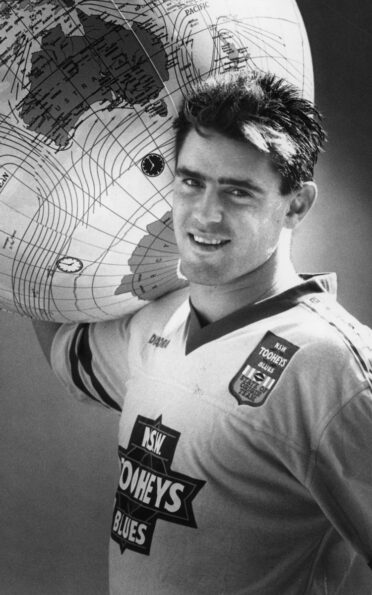
Brad Fittler’s standing in State of Origin was recognised after his farewell in 2004, as an award was named after him to recognise New South Wales’s best player of each Origin series. The Blues’s youngest ever Origin player when he debuted at 18 years and 114 days, he became his state’s most capped Origin player with 31 appearances. He also led NSW to two series whitewashes, having skippered the Blues 14 times from 1995 to 2001. As State of Origin finished its fourth decade, Fittler became only the second coach to guide the Blues to more than one series win.
As a player Fittler’s versatility was such that he could have been picked at centre, five-eighth or lock in this Origin Immortals list. He was able to adjust not only to a variety of positions, but also to whatever was in front of him or around him during a game. Fifteen of his Origin appearances were at five-eighth, compared with nine in the centres, five at lock and two off the bench. He won the Dally M Centre of the Year award in 1992 and 1993, before winning the Dally M Lock of the Year award in 1994. He later won the Dally M Five-eighth of the Year award in 1998, 1999 and 2002. Although he was on the winning side just twice when he locked the scrum for NSW, he was chosen for this role in this list mainly because there were other irresistible candidates for centre and five-eighth. It would also be unjust for a player of Fittler’s calibre to be chosen as an interchange player. Curiously, he never won the man of the match award in Origin football.
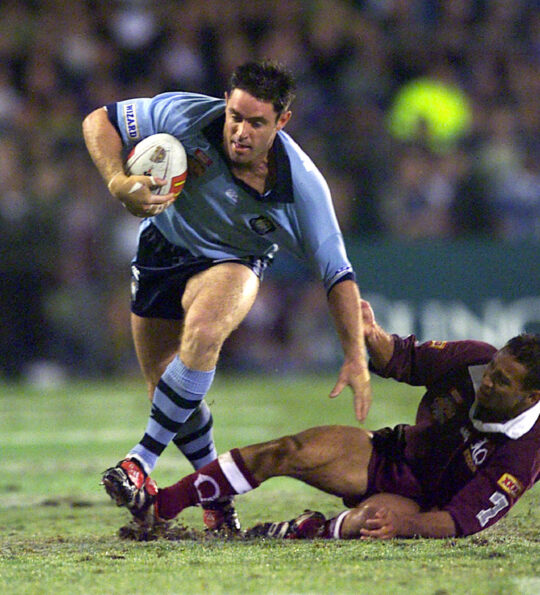
Fittler had superb ball skills and the ability to confound the opposing defence and create room to set up support runners. He was equally adept with delivering short, long and bullet-like passes, and he could kick effectively with each foot while also possessing a distinctive left-foot step. He also had great body strength, as he could take on any defensive line and break a tackle. According to a 2014 Rugby League Week edition titled 501 Origin Facts, Fittler’s 64 offloads were the most by a NSW Origin player. In a Rugby League Week edition titled Heroes of Origin, Darren Lockyer reported: “He was very skilful and a great ball-player and if he had to roll his sleeves up he could. He was a pretty big man and he was happy to lead with his actions. He’d get the ball, tuck it under the arm and run it. That is what I admired about him.”
Fittler’s Origin debut was at the unfamiliar venue of Olympic Park in Melbourne, for game two of 1990. Coming off the bench, he had limited opportunities as NSW claimed its first series win in four years with a 12-6 triumph. He didn’t play in the next Origin match, but later in 1990 he scored a try in Penrith’s losing grand final team before he became the youngest Kangaroo tourist when Australia toured Great Britain and France.
Fittler’s second Origin appearance was also as a replacement and, after Queensland narrowly won the first match of 1991, he again lost his spot. However, following an injury to Laurie Daley, the 19-year-old Fittler was recalled for the third and deciding game and was thrown in at the deep end as he opposed Wally Lewis at five-eighth. He set up a try with a rolling kick in just the second minute, but the rest of the match did not go well for him while the gods favoured Lewis in his farewell. Fittler spilled the ball just short of the try line on one occasion, and later he conceded a costly penalty that led to the final try. Queensland sneaked home 14-12. As Howell, Howell and Hastie prophetically reported in State of Origin: “Fittler will have his day someday, but on this one evening his lack of experience was badly exposed.”
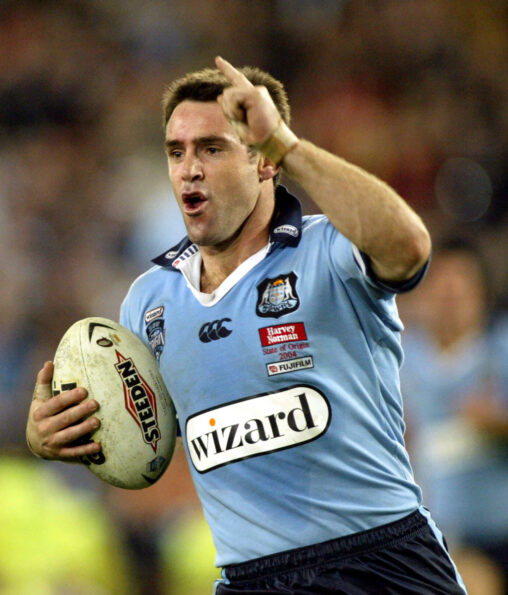
After taking part in Penrith’s breakthrough premiership later in 1991, Fittler became a Test regular from October of the same year. He lined up in the midfield in each Origin match from 1992 to 1994, when NSW achieved its first hat-trick of Origin series wins. He thrived under the coaching of Phil Gould, who was also his Penrith coach from 1990 to 1994 before the duo later reunited at the Sydney Roosters. Fittler had a hand in a couple of tries in the 1993 Origin series before setting up a try with a deft kick in game one of 1994, but he didn’t score his first points until the third and deciding match of 1994. He landed an unexpected field goal with about nine minutes left to increase NSW’s lead to eight points, before pouncing on a Queensland error to score a simple intercept try that sealed the series.
With Super League players missing the 1995 series, Fittler played at lock and pivot as he captained the Blues. NSW surprisingly lost the series 3-0, although the outcome could easily have been much different. All three matches were tight, and a well-timed pass from Fittler was correctly ruled forward in the final minute of game two as Tim Brasher crossed for what would have been a match-winning and series-levelling try. With Super League players back on board in 1996, Fittler’s fortunes changed 180 degrees as luck was on his side when he led his state to three victories in the number 6 jersey. In game one both of NSW’s tries came from Fittler kicks that bounced fortuitously. In game three he set up a try with a bomb before his field goal took his team to a 15-2 lead, which was crucial as a Queensland comeback fell short by a single point. With NSW having fielded the same squad of 17 throughout the series, Fittler commented in Rugby League Week: “For a series to have just one team, it shows how much stability there was.”
After missing the 1997 series with injury, Fittler played at lock in the first two matches of 1998 before reverting to five-eighth, while Laurie Daley captained the side throughout. Fittler was in superb form in the first two matches, scoring a try in each and causing Queensland’s wingers problems with his spiralling high kicks. NSW was a little unlucky to suffer a last-minute loss, having scored five tries to four, before winning game two convincingly and then losing the decider.
Fittler was first-choice captain from 1999 to 2001, although he missed game three of 1999 due to a groin injury. With the exception of game two of 1999, when he locked the scrum, Fittler played at five-eighth in each of his Origin appearances from 1999 onwards. His team lost game one of 1999 by a point, with the skipper missing a chance to level the score when his 78th minute field goal attempt sprayed wide.
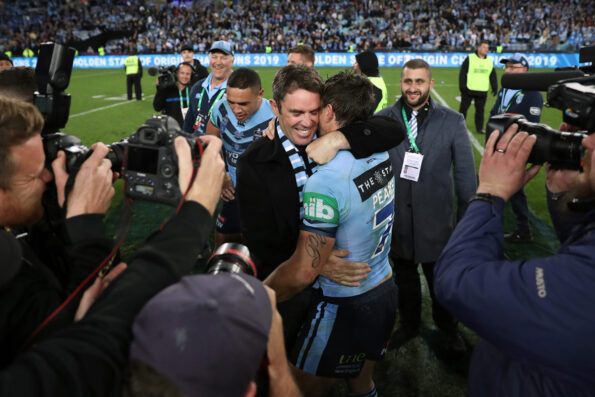
In 2000 Fittler led his state to a 3-0 series win for the second time. NSW was somewhat lucky to win the opening clash of 2000 before finishing the series with 104 points to Queensland’s 42, with Fittler having a hand in the lead-up to several tries. In game two he opened NSW’s account by using his footwork from close range and registering a fine individual try. After the Blues recorded a crushing 40-point triumph in game three, their captain was quoted as saying that he felt sorry for Queensland.
Aged 29, Fittler made the somewhat surprising decision to retire from representative football after the 2001 season. He scored a 60-metre intercept try in game one, but it was too little, too late as the Blues were ambushed by a young and inexperienced Maroons line-up. Despite landing a kick out on the full in game two, he turned in one of his finest Origin displays when he led his team to a 26-8 triumph. His defence was punishing and his attack was sound, and he scored NSW’s final two tries. Fittler also achieved the rarity of persuading a referee to change his mind when he convinced Bill Harrigan to overturn his original decision to award Queensland a scrum feed following a double knock-on. Veteran television commentator Ray Warren declared: “He [Harrigan] reversed his decision. Protest upheld… I haven’t seen that before, certainly not at Origin level.”
The Blues had a dream start to the 2001 decider when they scored after just 38 seconds, but the Maroons romped to a 40-14 win as they were inspired by Allan Langer’s shock return. Fittler tried hard overall and was involved in both of NSW’s tries, but it wasn’t his night. Coach Wayne Pearce commented in the post-match press conference: “There are not too many people in this room who have played one State of Origin. This bloke has played 29, and to be able to hold his head up even after a loss like this is a tribute to his character.”
With Gould coaching the Blues from 2002 to 2004, the man known as ‘Gus’ called on Fittler to return to Origin football for game two of 2004. The Maroons levelled the series, thus setting the scene for a combined Gould/Fittler farewell to Origin at Sydney’s Telstra Stadium. With seven minutes remaining, Fittler smothered a hopeful chip kick from Lockyer and ran unopposed to the posts. He touched down and was mobbed by his jubilant teammates. It was a fitting finale to Fittler’s Origin playing career, with the Blues winning 36–14. In Rugby League Week, Blues captain Danny Buderus said that Fittler had a “presence about him”. Buderus went on to say: “Even at Origin level he’s the team’s safety blanket – you always ran onto the field more confident when Freddy was there.”
Fittler was back in the Origin arena in 2018 when he became NSW’s coach, as the Blues sought their first series triumph in four years. He proved a revelation as he guided an inexperienced team to successive 2-1 series win, having won the first two matches of 2018 and the last two of 2019 while Kevin Walters coached Queensland. The 2019 series went down to the wire, as NSW sealed the series with a last-minute try in the decider. In 2020, Fittler suffered a surprise series defeat while Wayne Bennett guided the Maroons, with all three games played in November due to the COVID-19 pandemic.
Fittler’s Blues roared to a comprehensive series victory in the usual timeslot the following year as Paul Green was at the helm for the Maroons. All three games were played in Queensland as COVID-19 continually caused logistical issues, with Fittler’s team winning 50-6 and 26-0 before losing the dead rubber 20-18. Interestingly, Fittler coached the Blues to their biggest Origin victory after captaining them to their previous biggest win.
With Billy Slater taking over as Queensland coach, Fittler’s team sustained a somewhat surprising 16-10 loss at home in 2022, before turning a 12-8 deficit into a series-levelling 44-12 victory in Perth. NSW appeared well-placed for another series win as the Maroons missed several first-choice players in game three, including Cameron Munster who had excelled in the 2020 decider and game one of 2022. But less than two years after the surprise of 2020, the Blues again stumbled in a decider on Brisbane soil. Fittler’s coaching and team selections came under scrutiny in the post-mortems, as it seemingly became easy to forget that he was NSW’s second most successful coach in Origin football.
BILLY SLATER
QLD STATE OF ORIGIN PLAYING RECORD
POSITIONS: Fullback, wing, replacement
ACTIVE YEARS: 2004-2018
MATCHES: 31 (including two as a replacement)
WINS: 19
LOSSES: 12
POINTS: 12 tries – 48 points
QLD COACHING RECORD
ACTIVE YEARS: 2022-current
MATCHES: 3
WINS: 2 (series win in 2022)
LOSSES: 1

Billy Slater entered State of Origin folklore in just his second appearance when he scored a sizzling try at Suncorp Stadium. “Billy the Kid” was two days shy of his 21st birthday at the time. Maroons skipper Darren Lockyer put through a short and low kick for Slater, who burst onto it near the halfway line and veered right. With New South Wales fullback Anthony Minichiello approaching him, Slater chip kicked to the left and scurried through to swoop on the ball and cross the try line.
The momentous occasion was in game two of 2004, with Slater scoring two tries in a man-of-the-match display. However, it was not until 2008 that Slater was part of an Origin series win, and it was not until 2009 that he entrenched himself in the fullback role. The rest, as they say, is history.
Slater was among many major contributors in Queensland’s seven series wins from 2008 to 2015, and he also took part in Queensland’s 2017 series triumph before having mixed fortunes in his farewell in 2018. Many times he was widely rated as one of the best fullbacks in rugby league history. He possessed lightning speed, and had the uncanny ability of producing something out of nothing. His support play was a huge asset, and he was also skilful at leaping and knocking the ball back after one of his teammates put up a high kick.
Slater could be relied upon to make try-saving tackles as well. Johnathan Thurston classified Slater as a “once-in-a-lifetime player”, and commented in Johnathan Thurston: The Autobiography: “He stopped as many tries as he scored. In my eyes, he is Queensland’s greatest ever fullback, and that is a remarkable achievement considering he was dropped in 2005 and wasn’t picked again for three years.” Although Slater made a costly error from time to time, he had the ability to not let it get the better of him. Mercurial but also a match winner and someone with a genuine X-factor, Slater always had opponents on their toes.
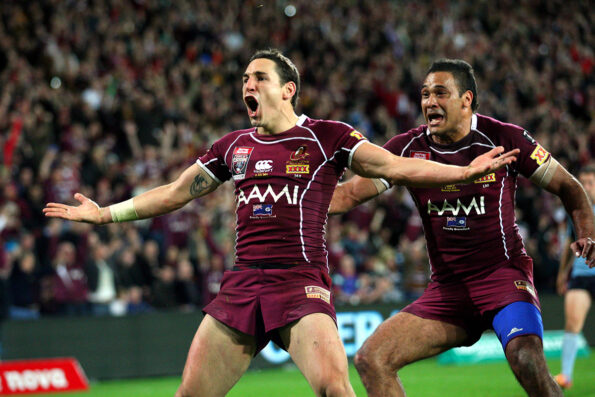
He played on the wing while Rhys Wesser was at fullback in 2004. Following his heroics on Brisbane soil, Slater came crashing back to earth in the series decider on Sydney soil three weeks later. In the early stages, NSW second rowers Nathan Hindmarsh and Craig Fitzgibbon produced a lifting tackle and slammed Slater on his back. For some reason a penalty was not awarded even though Slater’s legs were well above the horizontal, meaning the tackle should have been classified as dangerous. Slater subsequently had an unhappy night despite scoring a try, with NSW romping home 36-14. NSW’s first try followed a mistake from Slater, who recklessly held the ball one-handed under pressure.
Having played at fullback in the first two matches of 2005, Slater lost his place after spilling two bombs and conceding a silly penalty in game two. Moments after fumbling a high punt in the first half, he atoned as he scored an 88-metre intercept try. This showed how dangerous he could be, but his next blunder from a bomb led to a NSW try as the pendulum decisively swung their way. Slater missed the 2006 series through suspension before injuries hampered him in 2007, so he was not recalled until 2008.
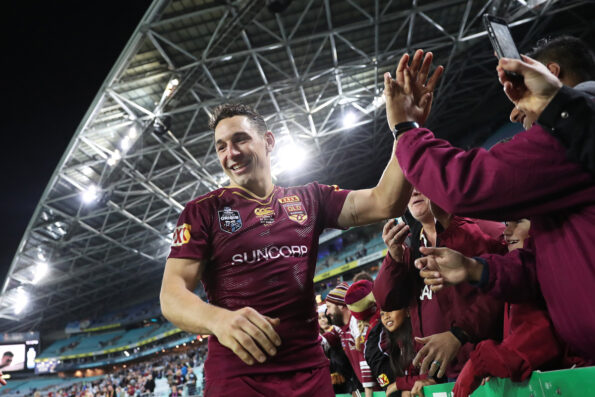
After a wayward display at fullback in the series opener, he was demoted to the bench for the second and third matches while Karmichael Hunt was preferred in the custodian role. “It seemed no way to treat a player who as much as anyone else could compel a crowd to its feet, but Queensland’s selectors seemed to think they had better options, or that the little errors Slater had in his game outweighed his match-winning abilities,” Paul Connolly reported in his book The Streak.
As it turned out, halfback Scott Prince broke his forearm in the 15th minute of the 2008 decider, which resulted in Slater playing most of the match at fullback while Hunt moved to five-eighth and Thurston to halfback: their same positions from game one. Ultimately, Slater scored the winning try as he backed up a break from Thurston. In hindsight, he seemingly turned a corner in his Origin career.
The 2009 series was somewhat typical for Slater, who had some great moments but also made some errors that led to NSW tries. In game one he showed his incredible athleticism when he chased a grubber kick and flew spectacularly to force the ball for a try just centimetres from the dead-ball line.
Perhaps 2010 was Slater’s best year in Origin football as he won the Wally Lewis Medal, while Queensland topped off its fifth successive series victory with a series clean sweep. In the first half of game one, Slater swooped on a banana kick from Thurston to score a try. In game three, man of the match Slater made a brilliant try-saving tackle on Anthony Watmough and later scored a vital try as he bamboozled NSW’s defence with mesmerising footwork.
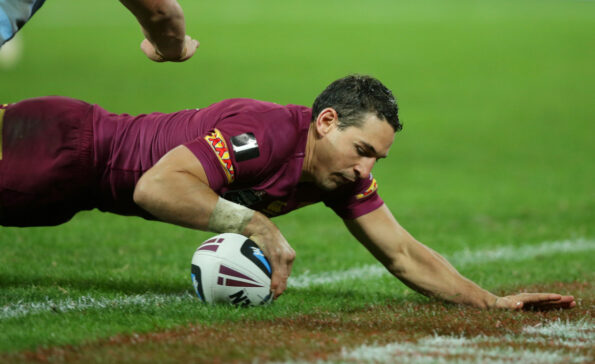
In 2011 Slater scored the winning try in game one as he powered onto a Lockyer pass and sliced through the defence. In game three he played a key role in the lead-up to the opening two tries and later burst through to score off a clever set play to effectively seal the series.
Slater and teammate Matt Scott crucially saved a try when NSW led 4-0 in the 2012 series opener, before a brilliant no-look pass from the Maroons’ custodian set up Queensland’s first try. Slater was a little erratic in game two, before missing the decider with injury. He played in another series win the following year, before Queensland’s eight-year series-winning streak ended on his 31st birthday as NSW narrowly won game two of 2014. Slater had a hand in a couple of tries in 2015 before injury forced him out of the decider, which Queensland won with a record margin.
Slater’s troublesome shoulder also forced him to miss the 2016 series, before he was surprisingly overlooked for the first game of 2017. Brought back for game two after the Maroons lost game one decisively, he had a hand in two of Queensland’s three tries. With Queensland trailing 16-12 in the last five minutes, Slater drifted sideways before linking with Michael Morgan, whose flick pass led to Dane Gagai’s series-saving try. With Darius Boyd and Thurston missing game three while Greg Inglis and Matt Scott missed the entire series, Slater’s experience and fine form were invaluable as the Maroons won comfortably.
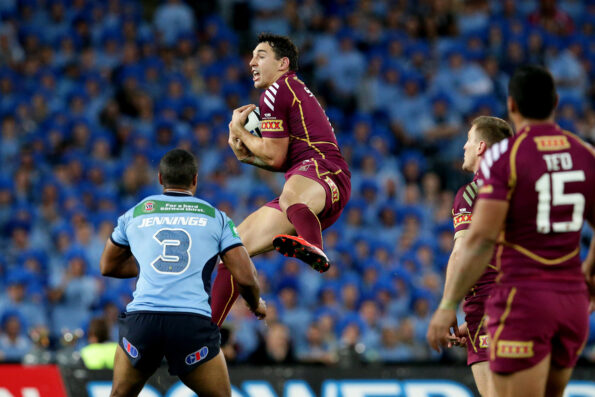
Despite missing game one of 2018, Slater’s displays in the remaining two matches enabled him to somewhat controversially win the player of the series award. He also became the fifth Queenslander to play Origin at 35 years of age. A roaming Slater played a vital role in two tries as Queensland jumped to a 10-0 lead in game two, only for NSW to score 18 unanswered points and later hang on for a series-sealing 18-14 victory.
With Inglis sidelined from the third match, Slater gained the Queensland captaincy for his final Origin appearance. He retrieved a chip kick from teammate Daly Cherry-Evans and appeared to score the opening try, but it was disallowed after replays showed that Slater juggled a ball that had touched an opponent. In the second half he threw the final pass for a try to Valentine Holmes as Queensland levelled the score before going on to win 18-12. After full time, Slater was triumphantly chaired off the field by Melbourne and Queensland teammates Cameron Munster and Will Chambers.
In an edition of Rugby League Week titled Dynasty that focused on Queensland’s domination from 2006 to 2012, Lockyer said of Slater: “While he has come up with a lot of the big plays, it is the little things he does for you as a team that makes him so special. Billy is never lazy. He is always going to be on the spot… Billy is by far the best positional No. 1 in the game and it is because he has the work ethic and he wants to be where we need him. Billy is ready to pounce on any opportunity. It is great to have a fullback with such skill and a great work ethic at the same time. Defensively he is fantastic and he is always looking to get the ball on the full.”
In another edition of Rugby League Week titled Heroes of Origin, Lockyer reported: “Other fullbacks float around the field but he [Slater] wants to be involved in every play. You can hear him when he is behind you saying, ‘Put a kick over here for me’. He’ll tell you, ‘I’m inside’ or ‘ I’m outside’. He is so quick, reads the game well and has that excellent work ethic out there that makes him the perfect fullback.”
Slater became Queensland’s coach in 2022 after Paul Green guided the Maroons in 2021 when they suffered two hefty defeats. Slater coached several players he had played with in 2017 and 2018, and added another dimension to his immortality as Queensland recorded a stunning series win. The Maroons won game one by six points following a masterclass from Slater’s ex-teammate Cameron Munster, and then suffered a 32-point defeat in game two after holding a four-point lead in the shadows of half-time. Despite the absence of Munster in game three, Slater’s team earned a shock 10-point triumph on home soil.
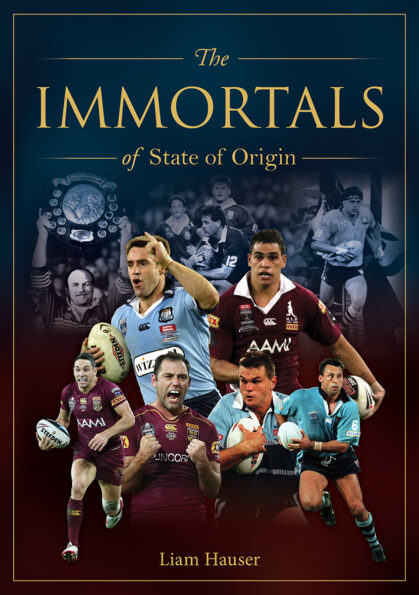
ALL PHOTOS COURTESY OF NEWSPIX
This is an edited extract from The Immortals of State of Origin by Liam Hauser (Gelding Street Press, $39.99rrp)
For the full article grab the June 2023 issue of MAXIM Australia from newsagents and convenience locations. Subscribe here.






























